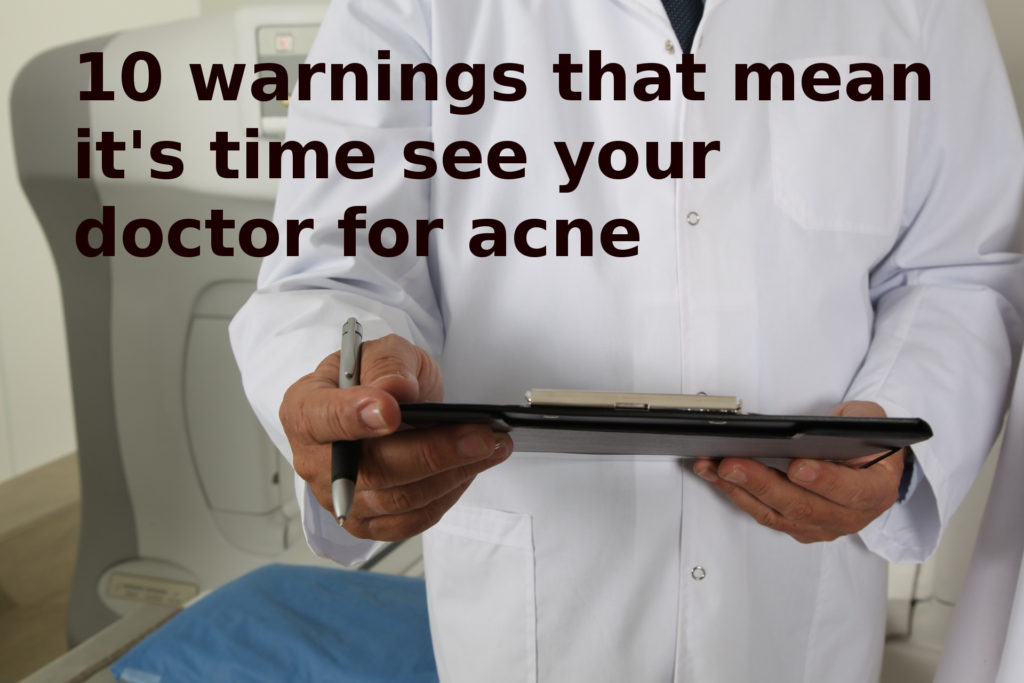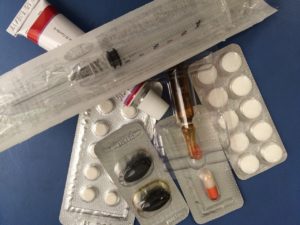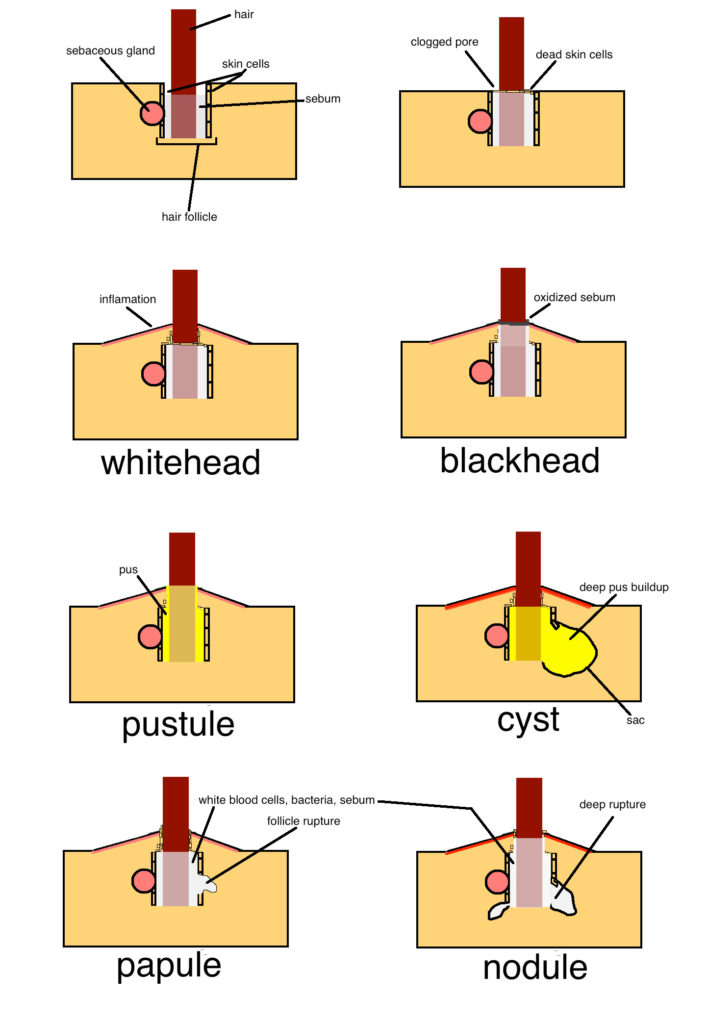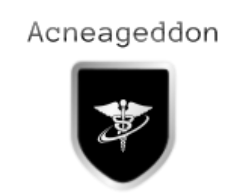
I’m checking out various acne forums and find hidden in the subtext of many posts a common concern. When is it time to go to the dermatologist for acne? Time after time, I see people pouring out their stories, posting pictures, desperate for that one piece of info that will finally fix their acne signs. Many know that they are at a point where seeking a medical professional isn’t merely prudent but necessary.
I’ve had many experiences with medical doctors over the years. The good, component ones more than make up for the few bad ones. Acne may not fall under the category of life and death (though it can feel pretty close), but there are certain things to watch out for. This blog post is dedicated to anyone trying to find answers and is probably better suited seeking medical help.
Use this checklist as a starting point and figure out the best course to chart for you.
Acne appears after you start taking drugs and medication (side effect)
This is critical because in our pursuit of finding answers, inevitably trial and error is involved. There’s several types of drugs and medications that can cause acne. The following list isn’t all inclusive but worth keeping in mind when ruling out factors.
Recreational drugs
Cocaine and amphetamines both aggravate acne. This is hardly the only reason to avoid them, but a good one none the less.
Cold and flu medicine. Say what? Yes, people can abuse certain types. The bromides they contain can cause acne.
Marijuana—can create hormonal imbalance by lowering and raising testosterone. This may trigger acne as a side effect. Despite widespread, continued acceptance, it’s a good idea to refrain—especially if you’re a teen. This may not be applicable to CBD, though.
Prescription drugs (check with a pharmacist or doctor for exact names)
Steroids – The ones that bodybuilders use are a no brainer but there are more. Cortiscosteroids used for asthma and lung diseases can also cause acne. Cortiscosteroids mimics cortisol which is a steroid your body produces during times of stress. It also elevates sebum production which can lead to blemishes.
Hormone medications – This a wide and varied category. Basically, anything that affects your hormones: Thyroid medication, Pituitary medication and hormonal birth control (some more so than others). I covered some of the pros and cons of hormonal birth control in my post about hormonal acne.
Weight loss/diet drugs – There’s a list of them that fall into this category but it’s also the reason amphetamines can cause acne breakouts.
Psychiatric medication — This is a broad category with many different medication and disorders involved. Anticonvulsants and drugs in this class can cause blemishes. Certain types of Bi-Polar medication, too. ADD and ADHD drugs are similar to amphetamines and come with the same side-effects. Certain antidepressants and sedatives are problematic. Also, a few medications used to treat drug addiction, specifically alcohol abuse can pose an issue.
Immune suppressant drugs – Think of medication someone needs to take before they get a transplant or after so the body doesn’t reject the new organ or tissue.
Medication for certain diseases – There are some medications that fight malaria and tuberculosis that fall under this category.
Medications that contain Iodine or Bromine – There are fewer of such medications than in years past but it’s a good idea to check with a pharmacist or doctor if you have any questions.
Industrial chemicals
While it may be impossible to avoid every chemical irritant, it’s wise to pay particular attention to certain kinds in regards to acne.
Dioxin – Exposure is a major concern for those that come into heavy contact with pesticides and herbicides.
Housing and construction – There are tons of chemicals that you can come in contact with that may make your acne worse. Various solvents, epoxies and tars need to be paid special attention to.
Grease – If you are involved in cooking or food prep, grease exposure is common. Also, if you work on cars, contact with grease is constant.
Halogen containing chemicals – We know that bromide and Iodine fit this bill, but chlorinated chemicals are also a problem. Chloracne is sort of a catch all term that applies to acne induced by chemical exposure (not only chlorine). At some later date I plan to go into chemical induced acne further.

When your current OTC regimen is falling short
This is subjective because not everyone uses products the same way. Some may use an OTC product sporadically for a month, throw in the towel and move on to the next. Another may be particularly dedicated, follow the instruction and ditch the product after a few weeks for lack of progress.
I can’t say for certain which approach is ideal, only that various products take time. If you don’t allow enough time to see a product is effective, you are no better off having never tried it in the first place. Some products take months to see results. On the other hand, I know what it’s like to get super excited about a product only to have results be the opposite of what you intended. This is the tricky part. Certain products may make acne worse initially and then get better with consistent and persistent use.
So when to see a dermatologist isn’t a one size fits all solution. If you have tried multiple OTC treatments along with eliminating certain diet triggers, all to no avail, then it’s time. I’m not going to give a specific number but most people probably don’t need a dermatologist for mild acne. Make sure you’ve used the various acne treatment programs properly, allowed enough time to see them through before making the call. If you find these OTC treatments are failing and the acne is getting worse, get yourself to a dermatologist.
Never had significant acne then one day– Boom!
This piece of advice is especially critical if you are outside of adolescence. Any number of factors could be in play. New medications, chemical exposure, dietary or life changes (elevated stress) could account for some of this.
Once more, if you are having significant hormonal disruptions, it’s a good idea in general to see a medical practitioner and get to the bottom of what the culprit is. Without the benefit of a trained medical professional, you risk turning a manageable problem into a regrettable mistake.
Cystic Acne is forming
Unfortunately, cystic acne usually results because of hormones. Because it falls deep within the skin, it’s difficult for many types of OTC treatments to reach. If left untreated, the potential for scarring is increased. Another consideration is that cystic acne usually isn’t a one off occurrence, necessitating stronger treatment.
A dermatologist has the ability to prescribe medications that can treat and prevent cystic acne. Several treatments like hormonal birth control (some may make it worse, too), extra strength medicinal creams, antibiotics (oral and topical), retinoids, spironolactone and isotretinoin (Accutane) may be able to provide relief. Each one has its own set of pros and cons, but the fact remains you need a doctor’s prescription to get them.
When to see a dermatologist for acne can be tricky. Want a Free Acne Guide? Click Here.
There may be an underlying health condition
A pimple here or there is a nuisance. A legion of pimples all over could be a sign that something more is happening with your body. That’s what makes diagnosing yourself so problematic. Sure it could be hormonal related and it may be linked to changes in lifestyle, diet and environment, but what if it’s something worse?
On the one hand, problems like rosacea (demodex mites) and keratosis pilaris can often be confused with acne and are a problem but not a calamity. On the other hand, there are other health disorders, namely inflammatory conditions which pose risks. Namely, conditions like polycystic ovarian syndrome, or a less common but serious condition called SAPHO—synovitis, acne, pustulosis, hyperostosis, and osteitis. Also, other more serious health conditions should be carefully ruled out as well.
This necessitates seeing a doctor. Can a family doctor treat acne? Certainly, but for more serious cases, you’ll be referred to a dermatologist or another specialist that may need to run a barrage of tests to get clearer answers. This is beneficial because they are trained to recognize less common conditions and offer a treatment that may prevent the problem from growing worse.
Your self worth is plummeting and depression is crushing
I wrote a post about acne and depression. That fact you are growing increasing self conscious of the condition may be enough to warrant a talk with your doctor about acne. It’s hardly worth it to delay a trip to the dermatologist if your pimples are out of control. The consequences can be increased likelihood of scarring and prolonging of the problematic pustules.
While some of the medication prescribed may have severe side effects, it also might be the answer you need. That’s why medicine can be so tricky. What works for some, doesn’t for others. As doctors have some of the strongest options available, it makes sense to avail yourself of their expertise if less remedies aren’t succeeding. Seeing a dermatologist for acne may be the best option you have.
Your acne is getting more and more painful
Painful acne usually means cystic or hormonal acne. As discussed above, if you are having painful lesions that can be felt deep, it’s a sign you may need to see a doctor. Don’t delay as the deeper the acne, the more likely it is to scar. A doctor can prescribe a cortisone shot, which may relieve the inflammation. Keep in mind the shots may become less effective with more use. In addition, they may have side effects that warrant further research, but it can be a temporary solution until stronger methods are utilized and take hold.

Acne is prolonged and won’t go away
Typically, pimples come and go within a short time span. For zits that last only a week or so are usually comedones. They are formed by dead skin cells and bacteria in the right (or wrong) combination. The easiest method of acne treatment is to nourish the skin, keep it hydrated. In addition, exfoliation through scrubs or chemical exfoliants may be necessary to remove the dead skin cells.
However, if acne last and last, failing to come to a head, then in all likelihood it’s a cyst. Cystic acne is caused when bacteria get deep and underneath the surface the skin. This causes inflammation that causes pain. The fact that it’s deep makes it difficult to treat. That’s when a trip to the dermatologist for teenage acne treatment may be beneficial.
After acne pigmentation or acne scars are appearing
The worst is when you do everything right. You don’t pick at the zit. Or you use a proper response and follow acne treatment guidelines to the letter. Of course you’re patient with letting the ugly mass settle on your face for weeks while it heals. The scab falls off and hyper pigmentation is the result. This is usually short lived and goes away. What about when it doesn’t? Not the pigmentation but the scar.
When you start to notice divots or upraised skin in reaction to your pustules, it’s a good idea to consult with a dermatologist for acne options. While there are a number of treatments that can help the scarring (remember, it takes about 6 months to fully heal), it’s worth it to get to a doctor for acne asap. They have options and treatments that can diminish or stop the scarring. Worst case, you get the various types of scarring, a dermatologist can help you get your acne under control and go over options that may improve scar visibility.
Body acne is intensifying (scalp acne)
Can’t count the number of times in the past that I wondered if I should I see a dermatologist for back acne alone. It can really weigh on you. I wrote a post about body acne that covers some good pointers and things to consider. While hygiene is often the number one assumed underlying issue for body acne, it may not be the main issue.
If body acne is intensifying or refusing to wane, it could be a sign of an underlying health condition or hormones. People often are less likely to go to a doctor for body acne because it’s less visible. That’s a mistake because they may have the same underlying causes, only different locations.

Wrap up: See your dermatologist for acne
Sometimes we put off seeing a doctor for one reason or another. The fact is that’s usually to our determent. While acne medications and treatments can come with their own issues, most of the time they beat the alternative. Only you can answer when it’s time to see a dermatologist for acne, but it’s wiser to do it sooner rather than later.
While expense is involved (typical dermatologist acne treatment costs vary from hundreds to thousands of dollars), greater expense in emotional trauma may be the result if left untreated. I and others can offer up treatments and ideas for acne and skincare, but few people online are trained medical professionals. Delay may not merely cost you in exacerbation of scarring but it might cost you if the cause turns out to be something worse than symptoms.
Read the next article here.


Just blog walking and want to say hi to the owner. I’m enjoying reading your article. Thanks
Appreciate the feedback, Renato.
Some of these sections could be there own article. I’m really interested in knowing more about some of these chemicals and there connection to acne. You have so much material, I feel like you’re only scratching the surface of some of these topics. Still, great stuff.
Thank you, Klaus. That is the conundrum: fill out the material as wide as possible to the determent of the depth. It’s something I wrestle with in every article.
I’ll throw this open to anyone: Is there a demand for 5000+ word articles? Let me know.
Utterly well written articles. Really enjoyed looking at your site.
Thanks, Jamey.
Great Post! Thanks for sharing.
I’m like 7 out of 10 of these signs. Yea, I pass. LOL. Seriously, good insight.
7 out of 10? Good luck with your appointment and thanks for the comment, Jodi.
Going to the dermatologist for acne is a big deal. I’ve been outside of adolescence for a minute and started developing acne issues only recently and have been on the fence about going to a doctor. Awesome post! Keep up the great work! 🙂
My pleasure, JJ.
I always spent my half an hour to read this weblog’s posts all
the time along with a cup of coffee.
Glad you enjoy posts!